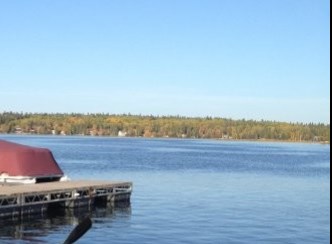For a second summer, the RM of Lakeland, Saskatchewan Polytechnic, and the North Saskatchewan River Basin Council have teamed up to improve water quality at Emma Lake.
The Emma Lake Action and Understanding project has been tracking water quality and working to mitigate shore erosion along the northern lake since April of 2019
Work on the project will continue into March 2021, said Katherine Finn, the basin council’s general manager, with plans for nine shoreline restoration projects and a demonstration site that will show the connection visitors have to the lake.
“A lot of people in Saskatchewan love going to their recreational lakes as a place to recharge and enjoy a lot of their summer activities. To enhance this and continue it for long into the future, we want to make sure the water quality is in a good place and the lakes are functioning as they should.”
Algal blooms in the lake have a big impact on water quality, so anything that can be done to reduce blooms will benefit the lake, Finn said.
“The algae, when it dies, sinks to the bottom of the lake and the bacteria that breaks that down and consumes it takes oxygen out of the water, so it reduces the dissolved oxygen for the fish.”
Ensuring a healthy shoreline ensures the water quality in the lake, Finn said, since shoreline erosion just means more nutrients in the water to feed the algal blooms. This year, as well as continuing the water quality survey, Finn hopes to restore two more private shoreline restoration sites to bring their total to five completed.
Education is also a big proponent of the project. Signage on the lake will help reduce boat traffic closer to the shore, therefore reducing turbidity which speeds up erosion as waves crash against the shore.
Cheryl Bauer Hyde, the RM of Lakeland’s reeve, said they are fortunate to be part of the project. The RM has been concerned with water quality and developmental impacts on the lake for sometime, she said
“It's been an ongoing process of looking at how we get at the science of what's taking place with respect to development, boat use, drainage, and all of the things that impact the lake.”
Knowing and understanding the science has brought some backing to what could be deemed arbitrary rules around boat and dock use at the lake. The rules around wave reduction from boat use, for example, is not something the lake authority put in place with little backing but was done in connection to the science they are seeing.
“There's real proof and science that if we do this, we can slow the impact of development. We can maintain or reverse some of the impacts of populations and all of those other factors,” Hyde said.
The water quality assessment is funded in part with Environment Canada.



